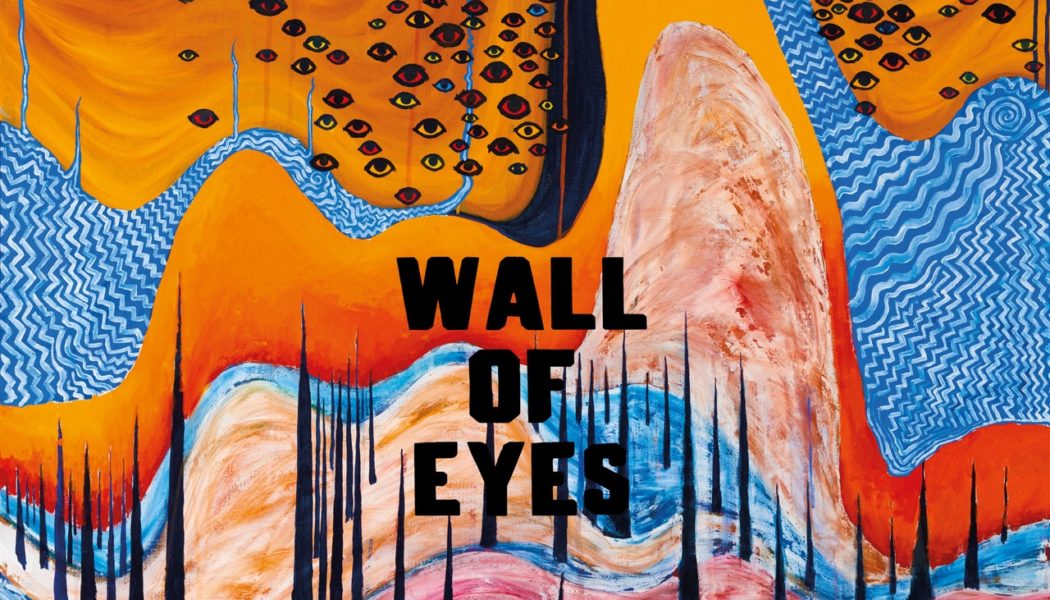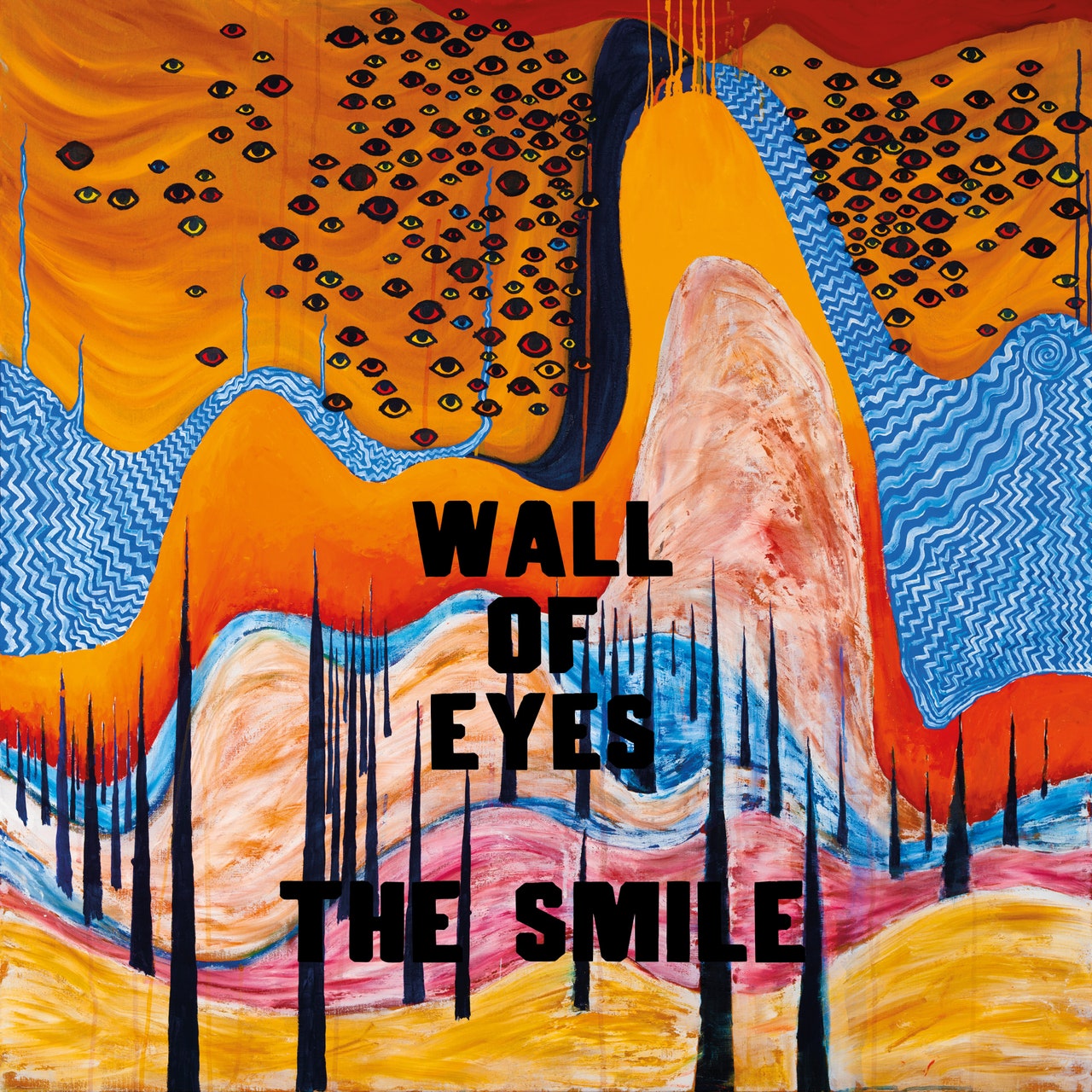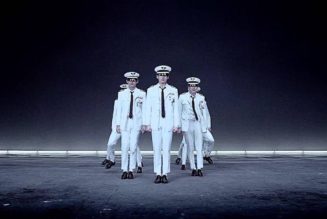As far back as 2009, Jonny Greenwood was fed up with the faff of the world’s most studious stadium band. “He can’t stand it anymore, the pace of the way we work,” Thom Yorke said that year. Despite the guitarist and composer’s impatience, he was prone to obsessing over what Yorke called the “extra things”: the sly strings and choked squeals that thread razor wire into Radiohead’s pillowed luxury. “‘Come on, we need some wrong notes,’ he’s always saying. OK, you got ’em,” Yorke joked.
But never have we heard Greenwood quite like this. On Wall of Eyes, the second album from the Smile, his hostile harmonies and expediency in the studio nudge the trio somewhere new; it is his most exciting and volatile performance since In Rainbows. No time for their usual effortful cohesion: Producer Sam Petts-Davies resolves to stress, not conceal, the eclecticism of Yorke and Greenwood’s songs, while drummer Tom Skinner squirrels around making nests in their inhospitable time signatures. After the debut’s big bang, Wall of Eyes connects the particles into somewhere you, and perhaps these restless musicians, might like to make a home.
More than anything on A Light for Attracting Attention, the Beatlesy “Friend of a Friend” and riotous “Bending Hectic” present contrasting spectacles of the Smile’s allure. The former draws inspiration from lockdown footage of Italians uniting in song on their balconies; the coda juxtaposes that pandemic solidarity against the elites’ response. “All of that money, where did it go?/In somebody’s pocket, a friend of a friend,” Yorke laments, invoking the COVID cronyism of Britain’s Conservative Party. But the tune is divine, even hummable—his deftest lunge for your heartstrings since unshelving “True Love Waits.”
At the other extreme, “Bending Hectic” indulges Yorke’s time-honored passion for calamitous automobile events—in this case the last moments of a public figure, apparently disgraced, who vows to drive off the Italian mountainside. The band plays the car-crash suicide ballad as a brilliantly twisted love song: Such is the narrator’s hubris that, when an orchestral crescendo signals the plunge, and Greenwood’s lustrous string bends transmute into tire squeals, we hear the infernal crusade as a valorous final act.
Across the album, Greenwood’s haywire guitars and arrangements veer between Can’s warehouse expressionism and Robert Wyatt’s alien-abducted folk fusion, conspiring with the live production and convulsive rhythms to save his bandmate from his more ponderous impulses. Yorke’s ethereal vocal register has long been his calling card and his crutch, tested to dizzying effect on the verses of “Climbing Up the Walls” before taking root on The King of Limbs. These days, he is split between warring impulses to command a song or spritz it with ghostly vapor. But even his weaker spells enchant, and Wall of Eyes opens with two irresistible slow burners: the wintry bossa nova title track, where he murmurs about digital surveillance and sedation (“You will go behind a wall of eyes/Of your own device/Is that still you with the hollow eyes?”), and “Teleharmonic,” from the “All I Need” school of fraught narrators caught in whirlpool synths, clinging to love like a life preserver.
By sequencing the two foggiest songs up front, the album lulls you into a trance. Then Greenwood’s guitar, coaxed from the sidelines, electrifies the nerve center on “Read the Room” and “Under Our Pillows,” an alt-rock suite of clanking-piston hooks and motorik finales. When the tension lifts with a music-box melody or swell of London Contemporary Orchestra strings, the songs have surprised us twice: first by forestalling expectations of beauty, then by providing it anyway.
The second side’s tour-de-luxe falters only on “I Quit,” one of those Smile songs that perhaps suffers from Greenwood’s desire to release records “90 percent as good [that] come out twice as often.” Where the arresting closer “You Know Me!” evolves Yorke’s paranoid balladry, “I Quit” is the discount “Codex” or “Tinker Tailor Soldier Sailor”: intoxicating as ever but without the final revelation—the sense of dawn penetrating some murky underworld—that tilts those Radiohead songs into the sublime.
After decades refining, refusing, and reformulating the Radiohead sound, Yorke and Greenwood seem emboldened to stop resisting—to loosen up and let their songwriting impulses absorb whatever happens to be on their stereo that day. Wall of Eyes gives center stage to jazz, kosmische, prog—aesthetic signposts and satellite genres usually kept in the more established band’s wings. The Smile, though stranger and wilder, more comfortably fit in the omnivorous art-rock tradition.
Greenwood’s fusion of refinement and insurrection echoes that of his beloved pianist Glenn Gould, who once made a nice observation about the pioneering modernist composer Arnold Schoenberg: “Whenever one honestly defies a tradition, one becomes, in reality, the more responsible to it.” As Radiohead defied rock convention, so the Smile cannot help but defy Radiohead. Yet defiance, Gould suggests, is the lifeblood of tradition. To defy classicism or rock or a cherished old band may finally preserve their sanctity. The defied thing endures—and then, if we are lucky, defiance provokes it to react.
All products featured on Pitchfork are independently selected by our editors. However, when you buy something through our retail links, we may earn an affiliate commission.










